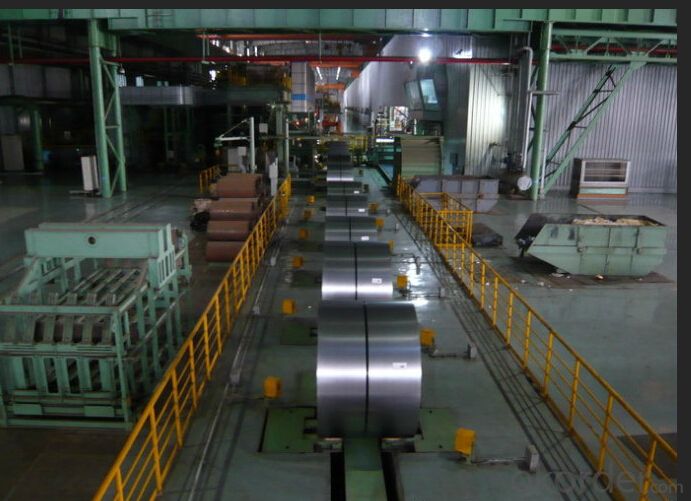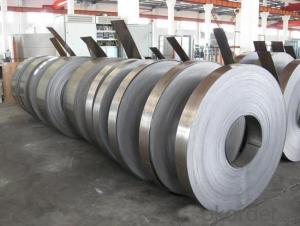Hot-Dip Galvanized Steel Strip/ Coil from China
- Loading Port:
- Tianjin
- Payment Terms:
- TT OR LC
- Min Order Qty:
- 25 m.t.
- Supply Capability:
- 15000 m.t./month
OKorder Service Pledge
OKorder Financial Service
You Might Also Like
1.Structure of Hot-Dip Galvanized Steel Strips Description:
Hot-dip galvanized steel coils are available with a pure zinc coating through the hot-dip galvanizing process. It offers the economy, It is especially useful for countless outdoor and industrial applications. Production of cold formed corrugated sheets and profiles for roofing, cladding, decking, tiles, sandwich walls, rainwater protective systems, air conditioning duct as well as electrical appliances and engineering.
2. Main Features of the Hot-Dip Galvanized Steel Strips:
• Excellent process capability
• Smooth and flat surface
• Workability, durability
• Excellent anticorrosive property
• Good visual effect
3. Hot-Dip Galvanized Steel Strips Images

4. Hot-Dip Galvanized Steel Strips Specification
1) Capacity: about 15,000 tons per month for sheet product.
2) Standard: JIS G3302 1998, ASTM A653M/A924M 2004, all according to the customer's request
3) Thickness: 0.13mm-0.5mm
4) Width: 400mm-1000mm
5) Length: We can adjust the length according to your request
6) Zinc Coating Weight: 60g/m2-275g/m2
7) Raw Materials: Galvanized steel sheet and Pre-painted galvanized steel sheet
8) Spangle: Regular spangle, minimized spangle and zero spangle
9) Hardness: Full hard, normal
10) Color: RAL, or other series
11) Surface Protection: PE, PVC, PVDF, SMP, HDP, etc.
12) Min trial order 10 tons each thickness, 1x20' per delivery
5.FAQ of Hot-Dip Galvanized Steel Strips
We have organized several common questions for our clients,may help you sincerely:
3. How long can we receive the product after purchase?
Production period is 30 days. And we’d prefer you can give us more time to book vessel.
- Q:How are steel coils used in the manufacturing of agricultural structures?
- Steel coils are used in the manufacturing of agricultural structures as they provide the necessary strength and durability required for building structures such as barns, grain storage facilities, and equipment sheds. These coils are often used to fabricate beams, columns, and trusses, ensuring structural stability and resistance to harsh weather conditions. Additionally, steel coils are also used in the production of agricultural machinery and equipment, further enhancing the efficiency and reliability of farming operations.
- Q:What are the common coil transportation methods?
- The common coil transportation methods include trucking, railway transportation, and shipping.
- Q:How are steel coils cut to size?
- Steel coils are cut to size using a process called slitting, where the coil is unwound and passed through a set of rotary knives that make longitudinal cuts. The width of the cuts can be adjusted to achieve the desired size, and the resulting strips are then rewound into smaller coils or flattened into sheets.
- Q:What are the common methods of preserving steel coils?
- Some common methods of preserving steel coils include applying protective coatings, such as oil or paint, to prevent corrosion and rust formation. Another method is using VCI (Vapor Corrosion Inhibitor) paper or film, which releases chemicals that prevent oxidation. Additionally, steel coils can be stored in climate-controlled environments or wrapped in moisture-resistant materials to minimize exposure to moisture and humidity, which can accelerate corrosion.
- Q:What is the average tensile strength of a steel coil?
- The average tensile strength of a steel coil can vary depending on the specific type and grade of steel being used. However, on average, steel coils tend to have a tensile strength ranging from 300 to 2,000 megapascals (MPa).
- Q:How are steel coils protected against fire and heat?
- Steel coils are protected against fire and heat through a variety of methods to ensure their safety. One of the primary ways to safeguard steel coils is by applying a fire-resistant coating. These coatings are designed to provide a barrier between the steel surface and the heat source, preventing direct contact and reducing the risk of ignition or damage. In addition to coatings, steel coils can also be stored in fire-resistant warehouses or storage facilities. These structures are constructed using materials that are resistant to fire, such as concrete or steel, and are equipped with fire suppression systems like sprinklers or fire extinguishers. These measures help to contain and suppress any potential fire, limiting its spread and protecting the steel coils. Furthermore, fire safety protocols and procedures are often implemented in facilities that handle steel coils. These may include regular fire drills, training programs for employees on fire prevention and response, and the presence of fire safety equipment like fire alarms and fire hoses. These measures ensure that any fire incidents can be promptly detected and addressed, minimizing the risk to the steel coils. Overall, the protection of steel coils against fire and heat involves a combination of fire-resistant coatings, proper storage in fire-resistant structures, and the implementation of fire safety protocols. These measures work together to mitigate the risk of fire and heat-related damage to the steel coils, ensuring their integrity and safety.
- Q:What are the different types of steel alloys used in coils?
- Coils commonly employ various types of steel alloys, each possessing unique properties and characteristics. Some frequently used types include: 1. Carbon Steel: As the most fundamental and widely utilized steel alloy in coils, it boasts low carbon content and renowned strength and durability. Carbon steel coils find extensive application in areas demanding high strength, such as automotive parts, construction materials, and machinery components. 2. Stainless Steel: Comprising an iron, chromium, and other element alloy, stainless steel coils exhibit exceptional resistance to corrosion, formidable strength, and heat resistance properties. They are typically employed in scenarios where shielding against corrosion and staining is pivotal, such as kitchen appliances, medical equipment, and transportation components. 3. Galvanized Steel: Galvanized steel coils are formed by coating regular carbon steel with a layer of zinc, furnishing excellent corrosion resistance and safeguarding the underlying steel from rust. Commonly utilized in outdoor settings like roofing, fencing, and automotive body parts. 4. Alloy Steel: Alloy steel coils are manufactured by incorporating diverse alloying elements like manganese, nickel, chromium, or molybdenum into carbon steel, thereby enhancing the steel's strength, hardness, and wear resistance. These coils frequently find application in industries necessitating high strength and toughness, such as machinery, tools, and construction equipment manufacturing. 5. Electrical Steel: Electrically specialized steel coils are designed explicitly for employment in electrical equipment like transformers and electric motors. These coils possess low electrical resistance and high magnetic permeability, facilitating efficient electricity conduction and magnetic field generation. Typically constructed from a silicon alloy, which enhances electrical and magnetic properties. In conclusion, the selection of a steel alloy for coils hinges upon the specific requirements of the given application, encompassing factors like strength, corrosion resistance, electrical conductivity, and heat resistance.
- Q:I have a Nike SQ Sumo 21 degree and it is a steel shaft. I hit the ball very high with this club and I lose distance. I don't hit any of my other clubs high it's just this one. Is it because of the steel shaft or is it the club? Help please.
- if you are a good player they say steel shaft is better. more consistent. I prefer graphite its lighter and I can flip my wrists easier.
- Q:what is the difference between METAL and STEEL?
- Most sheet metal is coated with galvanizing. Not fun to weld on. Most steel for welding use is just carbon steel.
- Q:What is the weight of a typical steel coil?
- The weight of a typical steel coil can vary depending on its size and thickness. However, a common range for the weight of a steel coil is between 5 to 15 tons.
1. Manufacturer Overview |
|
|---|---|
| Location | |
| Year Established | |
| Annual Output Value | |
| Main Markets | |
| Company Certifications | |
2. Manufacturer Certificates |
|
|---|---|
| a) Certification Name | |
| Range | |
| Reference | |
| Validity Period | |
3. Manufacturer Capability |
|
|---|---|
| a)Trade Capacity | |
| Nearest Port | |
| Export Percentage | |
| No.of Employees in Trade Department | |
| Language Spoken: | |
| b)Factory Information | |
| Factory Size: | |
| No. of Production Lines | |
| Contract Manufacturing | |
| Product Price Range | |
Send your message to us
Hot-Dip Galvanized Steel Strip/ Coil from China
- Loading Port:
- Tianjin
- Payment Terms:
- TT OR LC
- Min Order Qty:
- 25 m.t.
- Supply Capability:
- 15000 m.t./month
OKorder Service Pledge
OKorder Financial Service
Similar products
New products
Hot products
Related keywords





























